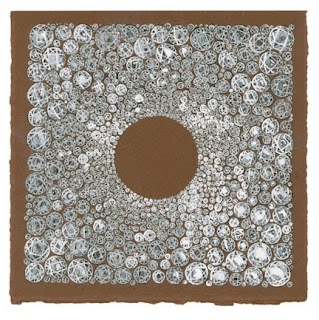According to feminist and sexuality theories devised by Michel Foucault and Jacques Lacan we have entered a "postidentitarian regime" defined only by actions performed.
 Tsuyoshi Ozawa
Tsuyoshi Ozawa"It is a matter of replacing the question of origin with that of destination. Where should we go?"
Bourriaud then cites Walter Benjamin and Art in the Age of Mechanical Reproduction, this is an inauthentic world of infinite reproduction. He suggests this notion will be especially challenging for Westerners who are the cultural heirs.
"Altermodernity promises to be a translation-oriented modernity, unlike the modern story of the twentieth century, whose progressivism spoke the abstract language of the colonial West." Explain? He suggests a type of Esperanto universal subtitling that affords no authenticity. Instead artists will be valued for the intercultural connections they establish. How will the artist profit if authenticity is questioned at every turn?
Globalization displaces cultural tradition for labor. Capital liquidity controls culture, further evidence of a homogeneous world. We all come to be part of the same tradition, responding to the same symbols and watching the same entertainment. With diverse values of increasingly hard to find, what will happen to creativity? The assimilation age will pillage others and history via globalization and democratization, leaving fewer and fewer stones unturned.
Is art only responsible for producing style? Is this the only function?
 Piet Mondrian
Piet Mondrian Joseph Beauys
Joseph BeauysHow is progress defined? The postmodern globalized world only measures progress in terms of monetary gain, but when GDP falters what happens to our sense motion?
"And yet the immigrant, the exile, the tourist, and the urban wanderer are the dominant figures of contemporary culture." 21st century flaneur?
 Sarah Morris
Sarah Morris"Thus, today's artists do not so much express the tradition from which they come as the path they take between that tradition and the various contexts they traverse, and they do this by performing acts of translation." Translation as interpretation? Selection as opposed to subtraction. Dj culture, choice is cheap and available.
 Mike Kelley, Memory Ware Flat #29, 2001
Mike Kelley, Memory Ware Flat #29, 2001"Thus, radicant art implies the end of the medium-specific, the abandonment of any tendency to exclude certain fields from the realm of art." What about craft? A tradition that inherently looks back and has difficulty assimilating the present. Does an artist work in service of his talents or the idea?
"Airports, cars, and railroad stations become the new metaphors for the house, just as walking and airplane travel become the new modes of drawing."
 Franz Ackermann
Franz Ackermann Julie Mehretu
Julie Mehretu"Abstraction is the very language of inevitability."
"A century later, one cannot but admire the contemporary relevance of his thought, which declares that the source and driving energy of all beauty is difference, yet never lapses into idealization of the other."
Something is always lost in translation.
Pg. 69 - Exoticism is on the decline, suggests a loss of creativity , energy, life - equated to entropy. Multitude represents the life force of human experience. We have a creolized world and art market.
Rareity as opposed to seriality.
 Haim Steinbach
Haim Steinbach Kelley Walker
Kelley Walker"Creolization produces objects that express a journey rather than a territory, objects that are province of both the familiar and the foreign." p. 74
"Epicurus wrote that the universe was nothing but a rain of atoms before the clinamen (spontaneous deviation) caused a pile-up accident, a collision that was the origin of worlds. Before the encounter takes place, the atoms fall like drops of rain, without meeting; their existence, as elements taking part in the encounter, thus proves to be purely abstract." p.75
Graft - tissue of one is merged to another.































 Thomas Noskowski
Thomas Noskowski







